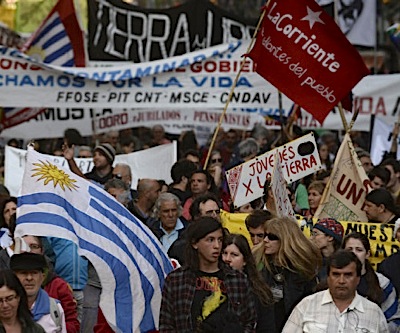Thousands march against large-scale mining in Uruguay

About 2,000 people, including environmentalists and horse-riding farmers, rallied Friday in downtown Montevideo, Uruguay’s capital, to protest against three large scale mining-related projects expected to begin before year-end.
The crowd asked the government to stop London-based Zamin Ferrous’s $3 billion Valentines iron ore project, an open-pit mine President Jose Mujica openly supports, as it would be the largest private investment ever made in Uruguay.
They also questioned two other projects: a regasification plant already given the green light to start construction in Montevideo, and a port that would open up the country to new markets, such as Asia.
Associated Press (in Spanish) reports that two days before the demonstration, one of the 19 Uruguayan departments — Lavalleja— passed a law prohibiting any kind of open-pit mineral extraction in the territory, confronting this way the national government’s recently approved law.
Lavalleja authorities and protestors alike don’t like the fact that Uruguay’s current mining regulation opens up the country’s 2,500 million tonnes of underground iron ore deposits to foreign exploitation. They claim it is a major threat to the development of the nation’s own mining industry.
However, analysts such as Victor Bacchetta, from the Movement for a Sustainable Uruguay (Movus), think that even with the presence of foreign companies, the country of only 176,000 km2 doesn’t have what it takes to become a mining nation.
“Uruguay is poor in mineral resources. It does not have the huge reserves of countries like Chile or Peru. [Zamin Ferrous, through its subsidiary Minera Aratiri] is proposing 12 years of extraction activities, according to what can be gathered from its Environmental and Social Impact Assessment, and after that it will all be over,” he recently told Argentina Independent.
“This makes the project even more absurd for Uruguay, because it is a country with a privileged ecosystem in terms of its fertile land and water resources, which are not found in the (Andes) mountains, where nothing else can be done,” he added.
If approved, Zamin Ferrous’s iron ore project in the Aratiri region, spanning five departments of the centre-west of the country, would generate $1.4 billion in exports annually over the 20 years of its life cycle.
Image: Screenshot from YouTube.
{{ commodity.name }}
{{ post.title }}
{{ post.date }}




Comments